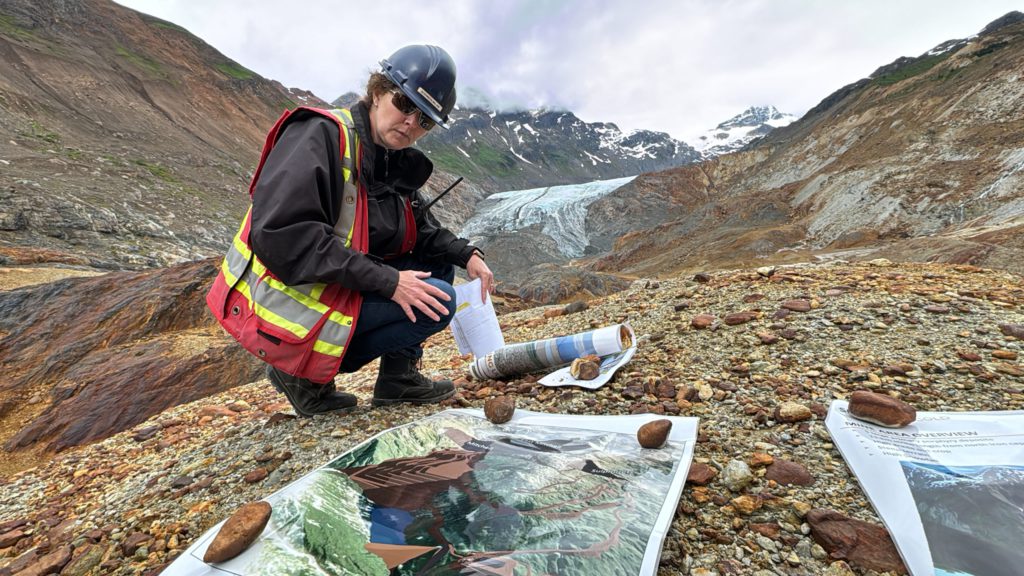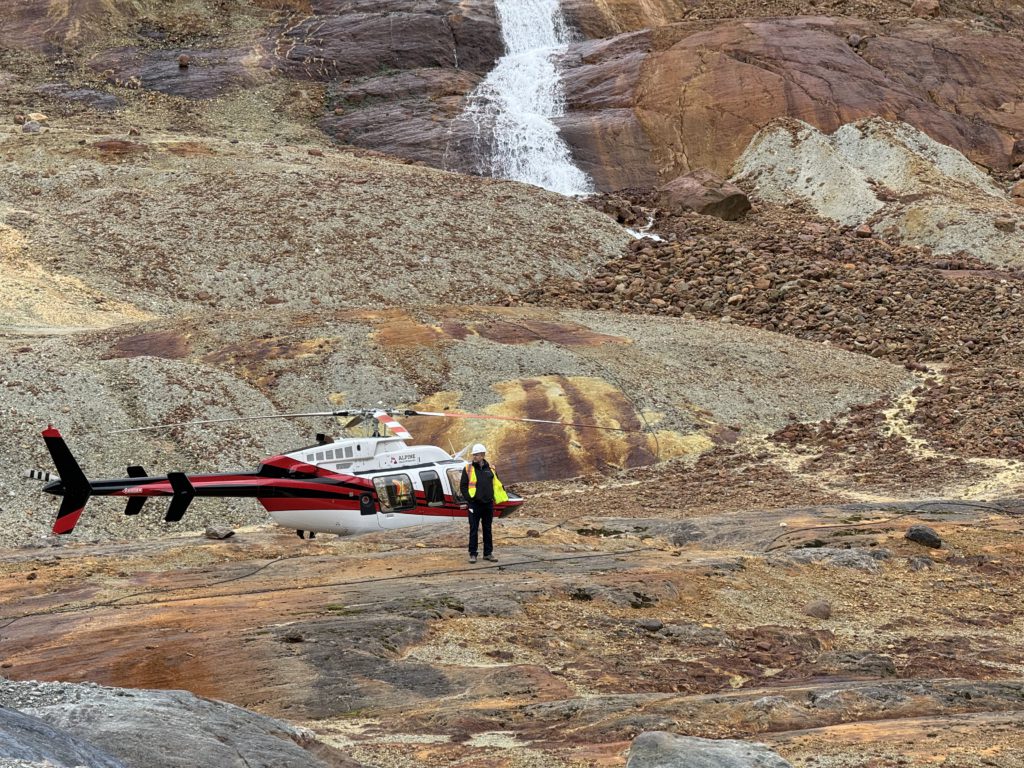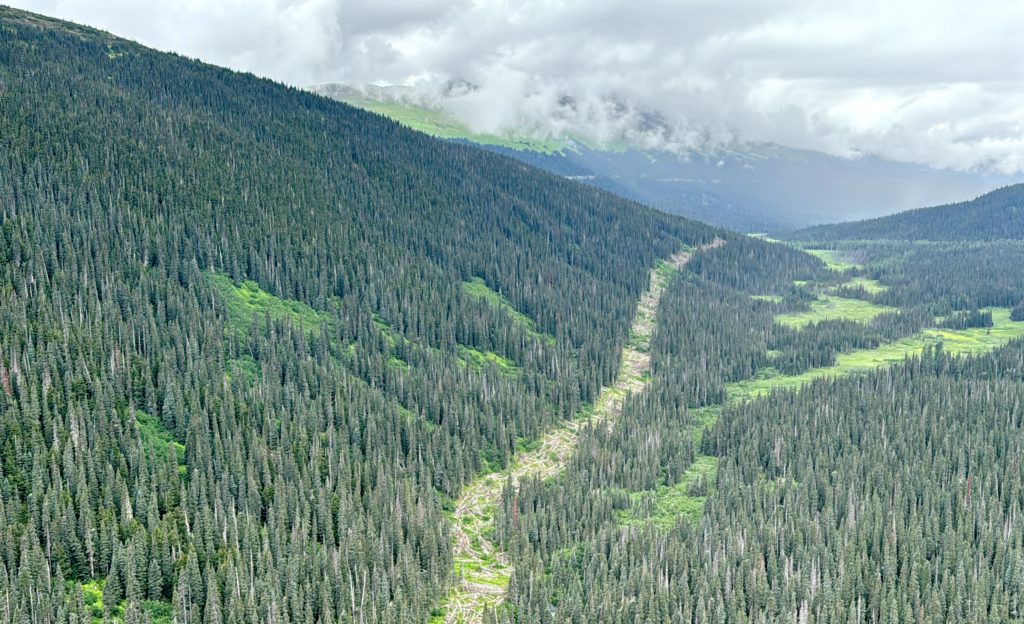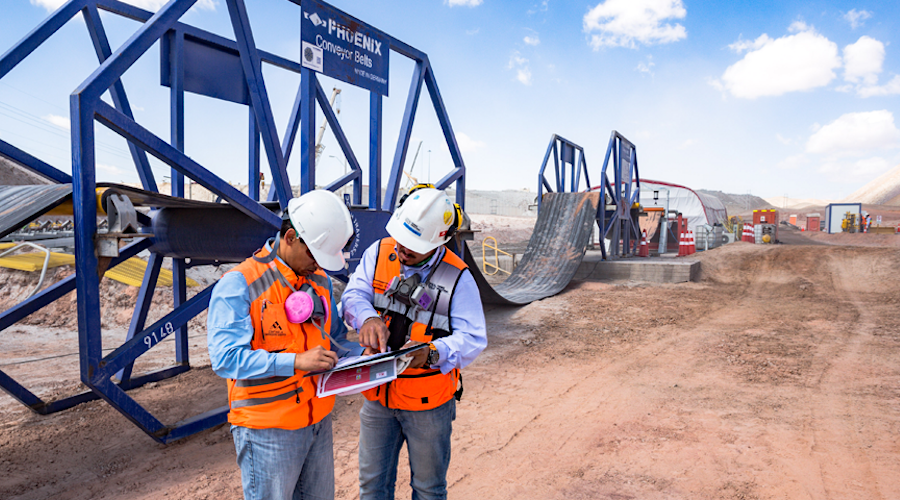KSM permit milestone builds ‘competitive tension’ for huge gold-copper project, Seabridge says

Seabridge Gold (TSX: SEA; NYSE: SAKSM) has long been seen as a juicy takeover candidate for its huge KSM gold-copper deposit, but its remote, mountainous location in British Columbia, $6.4 billion price tag, and uncertain permitting path have been obstacles to clinching a deal.
Now that one of those factors has changed—permitting—chairman and CEO Rudi Fronk says the company could be in a position to sign on a well-heeled joint venture partner within months to help it develop the mammoth project. He says he was close to signing a deal in 2020 when Covid-19 scuppered talks.
“With six major gold and copper companies currently at the table, we are confident that we will secure a partnership that aligns with our vision and financial strategy,” he told The Northern Miner during a site visit to KSM in late July. “The nice thing right now is for the first time ever, we have competitive tension going on in our process.”
RBC Capital Markets is managing a JV negotiation process, Fronk said. RBC has been brought in to manage and enhance the negotiation process for securing a JV partner, creating a competitive environment to secure the best possible deal for Seabridge.
A day before the permit milestone—a designation by the BC government acknowledging that construction at KSM has ‘substantially started’—Fronk predicted a deal could materialize quickly.
“Once the permit designation has been completed, we could expect a deal within four to six months, perhaps even sooner,” he said.
A ‘substantially started’ designation confirms the project’s environmental assessment certificate (issued in 2014) is valid for the mine’s entire lifespan. Seabridge has poured more than C$1 billion into the project since getting involved in 2000.
Besides the permit milestone, the federal and provincial governments’ July 15 commitment of C$195 million for local infrastructure improvements, including upgrades to Highway 37, signals strong governmental backing for the project.
Seabridge secured $150 million in funding about a year ago in a deal with Sprott Resource Streaming and Royalty, for which it has been conducting early work activities. Seabridge subsidiary KSM Mining gave up a 1.2% net smelter return (NSR) royalty on the project.
Fronk’s sought to advance the project with staged investments to reduce upfront capital requirements and equity dilution. “Our goal is to bring in a partner who will fund the bankable feasibility study and subsequent project financing, ensuring that Seabridge’s financial exposure is minimized,” he explained.
Martian landscape
During a recent visit, The Northern Miner saw the vast scale of the KSM deposits from the air, and inspected the progress of pre-construction activities at the Golden Triangle site.
Extensive road networks, bridges, and infrastructure necessary to support future construction and mining operations are already in place.
At the Mitchell deposit, one of several deposits at KSM, the tour helicopter touched down in what seemed like a Martian landscape, with outcropping mineralization staining the rocks around the glacial valley bright orange, yellow and turquoise. The deposit naturally leaches acidic water with a pH as low as 2.5 down the streams.
With a receding glacier as the backdrop, Elizabeth Miller, vice-president with environment and social responsibility, explained the Mitchell deposit is a cornerstone of the KSM project.

The 2022 prefeasibility study highlights the project’s flexibility, Miller said, allowing for different mining approaches and development plans that can be customized to fit a future JV partner’s skills.
Miller suggested the company had been holding back on doing a bankable feasibility study without the input of a funding partner.
Copper or gold?
Both Fronk and Miller stressed that KSM has so much gold and copper that it could be developed as either a primary gold or copper operation, depending on the flavour de jour.
Proven and probable reserves are 2.3 billion tonnes grading 0.64 gram gold, 0.14% copper, 2.2 grams silver, and 76 ppm molybdenum in the Mitchell, East Mitchell and Sulphurets deposits. Contained metal within the reserves comes to 47.3 million oz. of gold, 7.3 billion lb. of copper, 160 million oz. of silver, and 385 million lb. of molybdenum.
The 2022 prefeasibility study positions KSM as a gold project costing $6.4 billion, with an initial mine life of 33 years.
The prefeasibility study uses a base case gold price of $1,742 per oz. and estimates a payback period of 3.7 years, with an after-tax net present value (at 5% discount) of $7.9 billion and an internal rate of return of 16.1%.
According to the study, KSM would produce an average of 1 million oz. gold yearly, along with 178 million lb. copper and 3 million oz. silver. The life-of-mine strip ratio is favourable at 1:1, and removing capital-intensive block caves has reduced total project capital costs.
Block cave potential
In addition to the prefeasibility study, Seabridge also completed a 2022 preliminary economic assessment (PEA) focused on the opportunity to develop the copper-rich Kerr and Iron Cap deposits through block caving.
This study suggests a 39-year mine life, with the mill feed containing 16 billion lb. copper, 23.2 million oz. gold, and 122 million oz. silver. The base case for the PEA estimates operating costs at $0.38 per lb. copper produced after credits for gold, silver, and molybdenum, and a total cost of $1.44 per lb. of copper.

Initial capital for this copper-focused project is set at $1.5 billion, to be funded from the end-of-life cash flows of the 2022 PFS. The operation will support a 170,000-tonne-per-day mining rate and average annual output of 368,000 oz. gold, 366 million lb. copper, and 1.8 million oz. silver.
The PEA forecasts a total after-tax net cash flow of $18.5 billion, an NPV5% of $5.8 billion, and an IRR of 18.9%.
A January resource update for the Kerr and Iron Cap deposits shows Kerr now hosts 384.2 million indicated tonnes grading 0.22 gram gold per tonne, 0.41% copper, 1.2 grams silver, and 5 parts per million (ppm) molybdenum, and 2.6 billion inferred tonnes at 0.27 gram gold, 0.35% copper, 1.7 grams silver, and 21 ppm molybdenum.
Iron Cap contains 471 million indicated tonnes at 0.38 gram gold, 0.21% copper, 4.3 grams silver, and 39 ppm molybdenum. The inferred portion is 2.3 billion tonnes at 0.41 gram gold, 0.27% copper, 2.5 grams silver, and 31 ppm molybdenum.
A glimpse of progress
Miller noted the company has strong partnerships with the Tahltan Nation, Nisga’a Nation, Gitxsan Hereditary Chiefs, and local governments. “Their support not only reflects the project’s alignment with regional development goals but also our commitment to community engagement and social responsibility,” she said.
Beyond KSM, Seabridge continues to invest in exploration projects such as the nearby Iskut gold project, where on June 27, it published an initial resource on the Bronson Slope deposit of 517 million tonnes grading 0.33 gram gold per tonne, 0.09% copper and 2.7 grams silver for 5.4 million oz. gold, 1 billion lb. copper and 45 million oz. silver.
It also has the 3 Aces gold project in the Yukon.
The exploration plans for Iskut this summer include drilling about 15,000 metres, focusing on targets like Quartz Rise, Bronson Slope, and Snip North. At 3 Aces, the first 8,000-metre drill program is underway, targeting high-grade orogenic gold systems.
Seabridge shares last traded at C$22.91 Wednesday after setting a fresh 12-month high the day prior at C$23.48–up 86% over its period low of C$12.62. Seabridge has a market capitalization of about C$2 billion and a 0.56-oz.-gold-reserve-to-share ratio, a high figure compared with producing peers trending below the 0.2 level, according to Fronk.
More News
{{ commodity.name }}
{{ post.title }}
{{ post.date }}




Comments